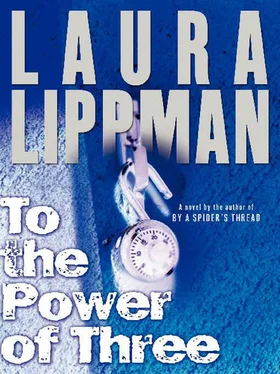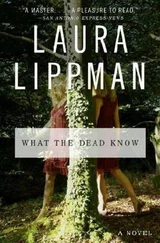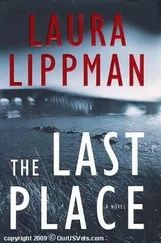“I always wanted a nickname, too. But my mom insisted that people call me Harold. Not Harry or Hal. Now I can’t bear it when someone shortens my name straight off, without even asking.”
Zip Kahn-what an unfortunate name to carry into adulthood-looked as if he wanted to say something normal, something expected, except he no longer knew what normal was. He and his wife had been at the hospital for almost seventy-two hours, going home only to shower. Of course Lenhardt couldn’t know what the guy looked like on a typical day, but there were traces of energy and vitality. Zip was stocky and athletic-looking, with a round face and an admirably thick crop of hair, the kind that never fell out and barely grayed.
“As I told you Friday, we traced the gun,” Lenhardt said, plunging in. “To Michael Delacorte.”
“Right. Perri baby-sat for the Delacortes.” He seemed to think this fact explained and closed the discussion.
“Now that we’ve checked it out, we don’t see any of the other girls having access to that gun. But I also have to assume you didn’t know it was in your daughter’s possession.”
Like a boxer getting a second wind, the guy seemed to sharpen through sheer will. “How can you be so sure the gun was ever in her possession? Have you been able to make that connection with certainty? Opportunity doesn’t equal certainty.”
Eddie Dixon had prepared the parents well, then.
“Your daughter worked for them. The other girls didn’t.”
“And Dale Hartigan was pals with Stewart Delacorte. For all you know, he took the gun, and his daughter took it from him, and that’s how it came to be at the school.”
Yeah, right. “We’ll ask him about that. Believe me. We’ll ask him.”
“Okay, then.” Said emphatically, as if something important had been settled. Lenhardt did not want to be unkind to the man, but he needed to tug him gently back to reality, away from the paranoid rationalizations he was using to comfort himself.
“Now, as you know, your daughter’s hands were tested for gun residue, but the weapon was a.22, which almost never leaves enough barium or antimony to detect.”
He could have said “trace evidence,” but he wanted to let the father know he was on top of the technical stuff.
“They bagged her hands. They put paper bags on her hands, and they wouldn’t take them off, not for hours. I wanted to hold my daughter’s hand, and I couldn’t. Can you imagine what that’s like?”
“I’m sorry,” Lenhardt said. With a look he tossed the interview to Infante. It wasn’t a routine with them, it wasn’t good cop-bad cop, just a rhythm born of practice. Lenhardt could imagine all too well what it would be like, seeing his daughter hurt, not being able to hold her hand.
“What we didn’t do on Friday was get fingerprints. We’re here today to do that, and we’re asking only as a courtesy,” Infante said. “The gun was taken from the home of a family for whom she worked. If her fingerprints are on the gun, we have to proceed on certain assumptions.”
They really wanted the fingerprints so they could ascertain the letter had been written and mailed by Perri, but Lenhardt and Infante had agreed between themselves not to mention the letter at the top of the conversation and, no matter what, not to reveal that it raised far more questions than it answered.
“I would think,” Zip Kahn said, growing more defiant, “that you would want to do quite the opposite. If you investigate on the basis of a narrow hypothesis, you end up finding what you were looking for. That’s human nature. You need to collect the facts with minds open to any possibility.”
“There is a witness,” Infante reminded him. “A girl who knows your daughter quite well, a girl who was there and has stated that Perri brought the gun to school and shot Kat Hartigan.”
“I’ve heard the Patels obtained a lawyer. Is that something all witnesses do? In fact, they’ve hired an excellent criminal defense attorney, Gloria Bustamante, someone who has a great deal of expertise in homicide. Why does Josie Patel need a lawyer?”
Damn Eddie Dixon. He was just too plugged in, Lenhardt thought. And if Dixon knew the Patels had hired Bustamante, he might know why as well.
“A letter arrived at the Hartigan house today,” Infante said. He was always coldly patient in an interview, unless the person opposite him required out-and-out bullying. Infante played it like a Department of Motor Vehicles bureaucrat, someone who couldn’t be moved under any circumstances.
“Which one ? The house in Glendale or the little love nest that he set up in Baltimore with his young girlfriend?”
His resentment was palpable, and it interested Lenhardt. Was Zip Kahn trying to suggest that Dale Hartigan deserved to have a dead daughter, because he had left his wife, while the still-together Kahns should not be penalized? Or was he bitter in the way some men were when they saw another guy get out? In Lenhardt’s experience, the only outsiders who begrudged a person the end of a marriage were those secretly wistful about their own.
Even if you were happy in your marriage, as Lenhardt was, it could give you a pang, seeing a guy your age with someone new, someone young. There had been a Christmas party last year, and he had been reminded of the kinds of girls that young cops can get-the pretty young emergency-room nurses, the good-time party girls, even an occasional assistant state’s attorney. Infante’s girl-of-the-moment was enough to give a man a coronary, with long black hair and big fake tits, not that Lenhardt deducted points for surgical enhancement. These were the girls that Lenhardt had once gotten, part of the reason he hadn’t married again until he was in his forties. And Marcia, twelve years younger, was the best of the best-cute, down to earth. Plenty of his colleagues still gave her approving looks. But it wasn’t the young guys and the young girls that had unnerved him at the party. What had been weird was seeing a guy his age, a robbery detective, show up with this total piece. Lenhardt could live with Infante’s beautiful girls, but it had been strange seeing fifty-two-year-old Fred Duda with a high-assed waitress.
“The envelope was addressed to Kat Hartigan,” Infante continued in his robotic voice. “It came to the house where she lived with her mother. Mrs. Hartigan says the handwriting looks like your daughter’s.”
“So what does the letter say?”
“It’s not so much what it said, “ Lenhardt put in, all too aware that the one-line letter could be a boon to a smart defense attorney. “It’s that we want to establish it isn’t a forgery. So between that and the nonconclusive tests on your daughter’s hand, we decided we should get her fingerprints sooner rather than later. Really, we should have done it earlier, but…”
He didn’t finish the thought, that they hadn’t worried about fingerprints because Perri Kahn was comatose, and not going anywhere.
Kahn made a move as if to crumple the coffee cup in his hands, realizing just in time it was still full. “That’s shitty,” he said. “That’s just plain shitty. You don’t need to do that now. My daughter might not live. Do you know that? So maybe none of this matters anyway.”
“But if your daughter didn’t send the letter, and her fingerprints don’t match any of the latents lifted from the gun, we need to know that sooner rather than later. Right? Like you said, we have to be open to every possibility.”
“Why? What does it say? Was it a threat?”
“It was kind of…obscure in its intent. In and of itself, the letter tells us nothing. That’s why we need to check the envelope against your daughter’s fingerprints.”
“Do what you have to do,” Zip Kahn said. “And go fuck yourself.”
Читать дальше












